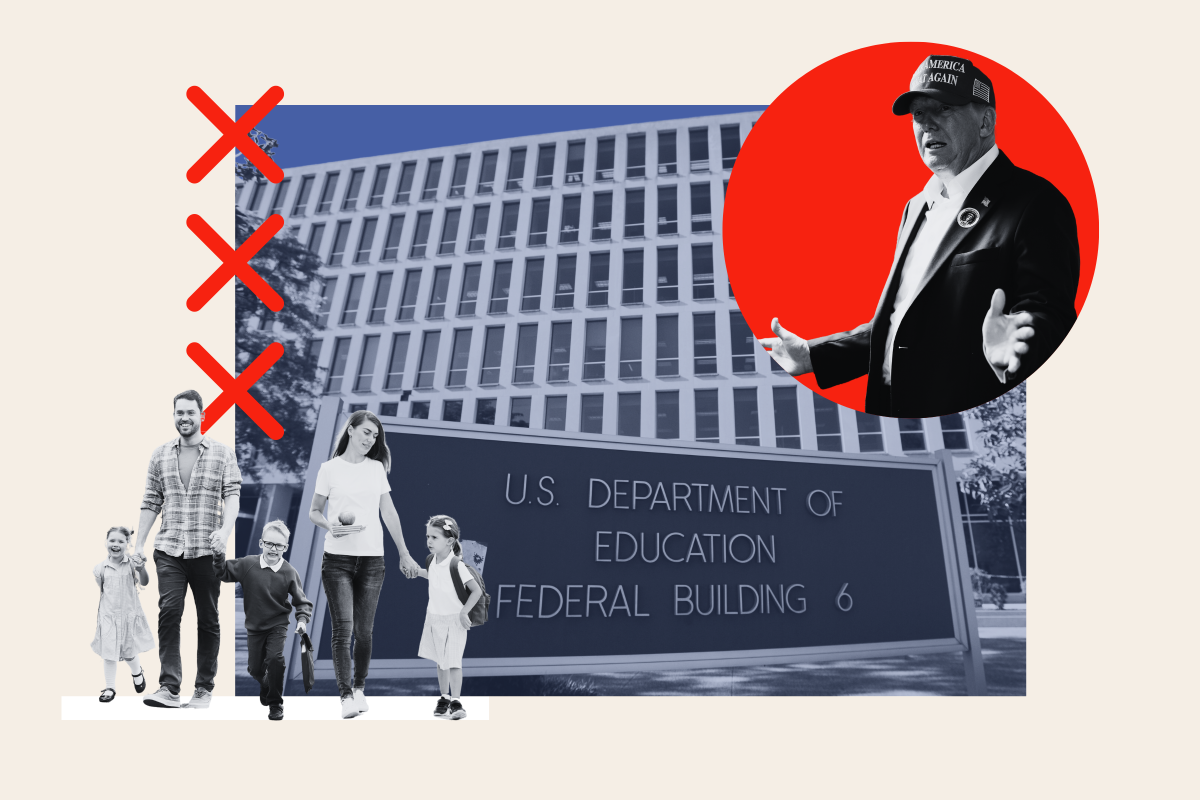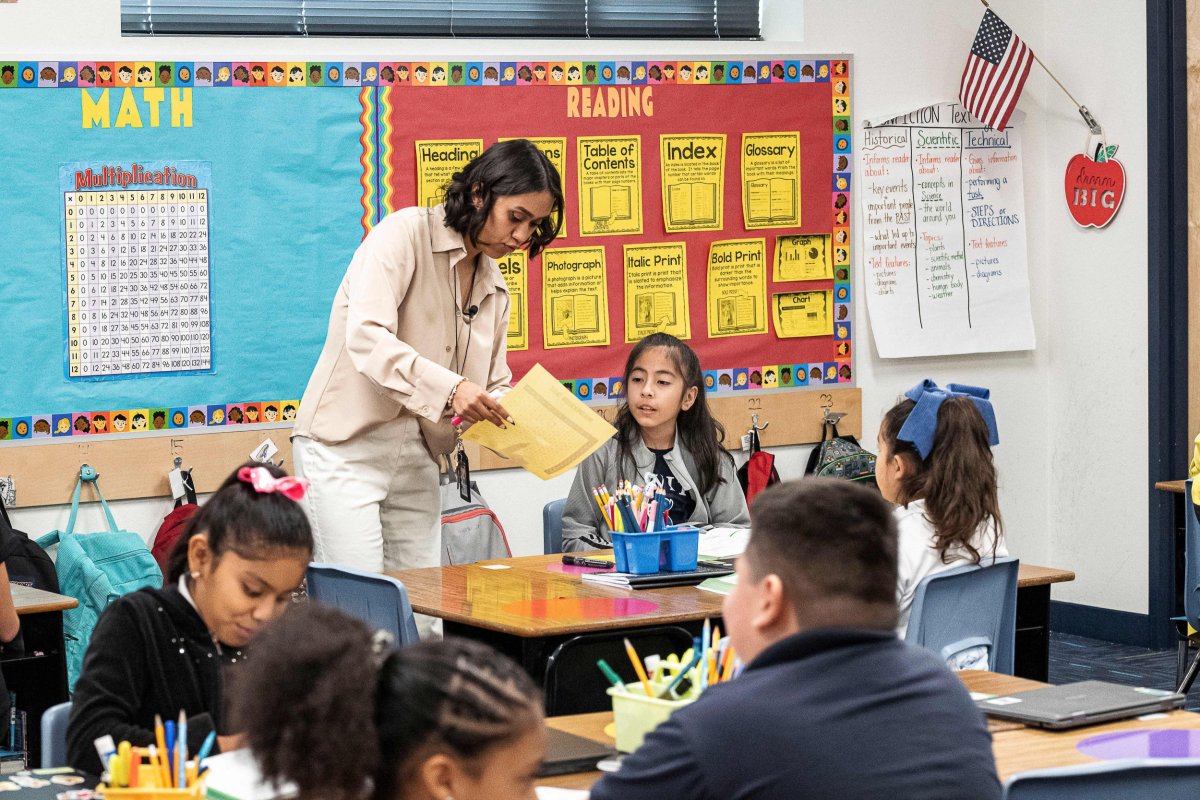While President-elect Donald Trump campaigned vigorously on a string of issues, the state of American education was not one of the mains sells of a second Trump term. Still, it's become a dominating policy point in the wake of his decisive victory, as his promise to eliminate the Department of Education (DOE) come into sharper relief.
Trump had repeatedly said on the campaign trail that he would "close the Department of Education, move education back to the states," reviving a promise that many Republicans, from Ronald Reagan to Ted Cruz, have flirted with.
"This is an age-old, Republican orthodoxy," Margaret Spellings, the former secretary of education under President George W. Bush, told Newsweek. "There's plenty of room for improvement at the Department of Education, that was true when I was there."
"The question becomes to what end? Why? And what's the best organizational structure to serve students?" Spellings said.

Since winning back the White House, Trump has doubled down on his plans to dismantle the DOE, saying in a video announcement that he plans to shut the department down "very early" in his second administration. That promise has left many parents, families and educators panicked and confused about how this will impact their children.
"In many of our communities, particularly across the heartland of this country, schools and school systems are the largest employers in the community and are something that draws the community together," former Massachusetts Education Secretary Paul Reville told Newsweek. "Most of those communities are now anxious to lose that."
Here's what we know about Trump's DOE plans:
What does the DOE actually do?
Created by Jimmy Carter in 1979, the DOE was split off from the Department of Health, Education, and Welfare as part of a campaign promise the Democratic president made to the National Education Association.
Since its inception, the departments biggest responsibility is dolling out federal education funds to supplement state resources and fund a variety of programs. Those programs include Title I, which provides financial assistance to schools with a high percentage of low-income students, and the Office of Special Education Programs (OSEP), which is dedicated to "improving results for infants, toddlers, children and youth with disabilities."

The DOE is also in charge of collecting data on items like enrollment and staffing, oversight of the federal student loan program for higher education and the investigations of civil rights violations.
In the 2024 Fiscal Year, the federal government allocated the DOE $238 billion, or less than 2 percent of the federal budget. Federal funds cover about 8 percent of K-12 educational costs, with most of the money coming from individual states.
"We've been recalibrating and relitigating the relationship relationship between the states and the feds since the founding of the Department of Education," Spellings said.
According to the Pew Research Center, 44 percent of Americans have a favorable view of the DOE. Public support is divided along party lines, with 62 percent of Democrats having a favorable view, compared to just 27 percent of Republicans. On a list of 16 federal agencies, the DOE ranks 14th, the third-lowest favorability after the Internal Revenue Service and the Justice Department.
What could happen to the DOE under Trump?
In an effort to curb what he sees as federal overreach and a misuse of taxpayer dollars, Trump is seeking to eliminate the DOE, but he would not be able to do so with executive action alone.
Instead, such a move would require congressional action and a likely supermajority of 60 votes in the Senate — which Republicans will not have. Even though the GOP has taken control of the Senate, having flipped four seats last week, they would still need significant Democratic support to get enough votes past the threshold.
On top of that, 60 House Republicans voted against an amendment last year that proposed closing the DOE, raising questions about how much GOP support there actually is for abolishing the agency.
Asked about Trump's plans to overhaul the DOE, multiple sources gave Newsweek the same warning: "The devil is in the details."
The president-elect has not offered an in-depth outline for how the dismantling of the DOE would look. The hardline Project 2025, which Trump disavowed during his campaign, proposes that civil rights violations become the jurisdiction of the Justice Department, that student loan matters fall under Treasury and that other responsibilities be left to the Department of Human and Health Services.
Trump's plans to relegate all educational responsibility to the states wouldn't necessarily upend the way most school systems are currently structured, given that education is already the responsibility of state and local governments. But taking the federal funds that states rely on—"money which they will be reluctant to have taken away from them"—could hurt the students that the DOE was meant to focus on, particularly low-income or special needs students.
Reville, who is also the founding director of the Harvard Graduate School of Education's EdRedesign Lab, said that one of the main purposes of the DOE is to pay special attention to disadvantaged youth, low-income children, students of color, students with special needs, English-as-a-second-language students and other children that fall under those umbrellas.
"If you're a parent of a child like that, you're likely to be very much on the alert to losing support, whether it's financial support for programs that serve the schools and the children in that category, or other forms of programmatic support," Reville said.

In 2001, President George W. Bush signed the No Child Left Behind Act into law. The bipartisan effort significantly increased the federal role in holding schools responsible for academic progress and put special focus on the performance of certain students in underserved populations. It became a signature achievement of Bush's presidency.
"I was proud to serve in George W. Bush administration," former Office of Special Education Programs (OSEP) director Stephanie Smith Lee told Newsweek.
"It would be a shame if our country decided that now it's okay to leave children behind."
What happens if my child is a special ed student?
The end of the DOE would be particularly concerning for parents whose children may rely on special education programs funded by the federal government.
Over 400,000 infants and toddlers as well as more than 7.35 million students ages 3 through 21 were served under the Individuals with Disabilities Education Act in 2021, according to a 2023 DOE report to Congress.
Smith Lee said while it's "premature" to assume that Congress would pass legislation eliminating the department, "there is deep concern for what lies ahead."
"These are very complex issues that really need a lot of thoughtful consideration," she said, emphasizing that dividing up OSEP from other DOE programs and spreading them around other federal agencies would "lose the progress that we've made."
One of the other big questions surrounding the dismantling the DOE would be whether the statistics and data gathered about special education students would continue in the same manner it's currently collected. Smith Lee said the current data shows that there have been significant improvements among these students "but without the data, you don't know where you are."
"All of us are trying to figure out and create new resources in an effort to tamp down a lot of the anxiety that's happening," Keri Rodrigues, the president of the National Parents Union, told Newsweek. "There are a lot of parents and families right now that do not understand the full scope of what it would mean."
What other education policies does Trump plan to enact?
The president-elect has said he wants to cut funding for any school teaching critical race theory or "transgender insanity" and to credential teachers who "embrace patriotic values and support the American way of life."
Trump has also expressed support for a nationwide school choice program, which would give parents credits to allocate public education funds to alternative schools, as well as ending teacher tenure laws and adopting merit pay.
Project 2025 has also proposed cutting the Head Start Program—a free, federally funded program that provides early childhood education and support services to low-income children and families—and rolling back the Biden administration's Title IX revisions that expanded discrimination protections on sexual orientation and gender identity.
In a statement shared with Newsweek, Randi Weingarten, president of the American Federations of Teachers, said: "Americans voted in state after state to protect public education and funding for public services, and they elected school board candidates who see public education as a pathway to opportunity."
AFT is the second-largest teacher's labor union in the country.
"Donald Trump and Republican elected officials have said they want to eliminate the Department of Education, which oversees programs that invest in low-income schools and help fund education for students with disabilities," Weingarten said. "But if they listen to what the voters have said, they will work to strengthen public schools, not dismantle them."
Is there good news for parents in Trump's education shakeup?
A second Trump term could mean a greater focus on parental rights, a movement that has grown in recent years.
When the pandemic took most classes online, parents, for the first time, had a glimpse into their children's classroom. Many were unhappy with what they found, prompting parental rights advocates to push for families to have a bigger say in their children's learning and several of these voices to run for school board positions.
"Parents got very suspicious of public schools during COVID for a couple of reasons," Reville said. "They didn't like the school closings, and then some of them didn't like what they saw on the videos of what was going on at school."
He said while the movement has likely peaked in terms of volatility, many superintendents continue to have real difficulty with deeply divided school boards and constituents. With Trump in the White House, he anticipates "some movement on parental rights."
"There's already a burgeoning school choice movement going on in the states, where a lot of states are giving aid directly to parents in the form of scholarships or vouchers," he said. "I expect that will be reinforced."
Rodrigues said even though there will be more opportunities for school choice, "we don't actually have enough private choice options."
"There's just a lot of confusion right now," she said.




















 English (US) ·
English (US) ·